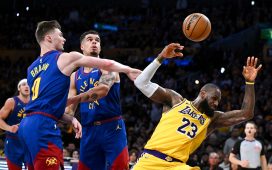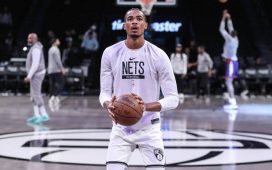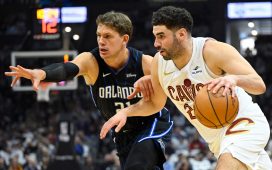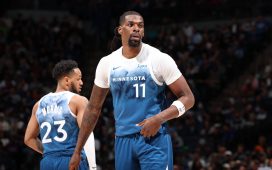LeBron James passing Kobe Bryant on the NBA’s all-time scoring list in Philadelphia should have been nothing more than a happy coincidence. Now it’s a cruel twist of fate.
Dwight Howard calling on Bryant to assist him in next month’s dunk contest should have just been another delightful chapter in Howard’s Lakers reclamation. Instead, it’s a reminder that not all stories get to come full circle.
Those moments from recent days now feel like the universe was screaming at us. Grabbing us by the hair and pleading: “Remember this man! Take this moment to appreciate him! He won’t be here much longer.”
Bryant’s helicopter crashed into a hillside in the Santa Monica Mountains on Sunday morning, killing all nine people aboard, including his 13-year-old daughter, Gianna. The sudden manner in which Bryant died makes the celebration of his basketball career that played out over the last few days all the more poignant.
Typically, only when a man dies slowly will his final days be filled with eulogies. But it is difficult now not to look back upon the days before Bryant’s death as a wake held in blissful ignorance — a chance to celebrate the man without the burden of grief that will now be impossible to shed.
As James closed in on Bryant’s career scoring total of 33,643 points, clips of Bryant in full poetic motion were dusted off and played on a loop. When James took the court Saturday night, it was with “Mamba 4 Life” scrawled on his sneakers.
In the locker room after the game, James spoke for several minutes uninterrupted about Bryant giving him a pair of shoes when they met for the first time in 2002 at the All-Star Game, also in Philadelphia.
“The story is too much,” James said as he retold it, marveling at the symmetry of their careers.
James idolized Bryant then passed him on the scoring list in a Lakers uniform in Philly. Wow.
“It’s surreal,” James said. “It doesn’t make no sense, but the universe just puts things in your life.”
When Howard, sitting at his own locker, tried to give James his proper due for the achievement, he uttered these chilling words: “We don’t appreciate each other as much as we should as a humanity. And I think something like that should be appreciated. You should appreciate people while they’re alive.”
Barely 12 hours later, Bryant, his daughter Gigi and seven others including the pilot of the helicopter, were dead. Howard and James, overcome by grief, were seen crying on the tarmac in Los Angeles after the team’s charter arrived from Philadelphia, their words from the night before taking on cruel but powerful new meaning.
There is no digesting the news of Bryant’s death. Even in retirement, he was a larger-than-life figure who towered over L.A. If the Lakers represent the cross-section of sports and entertainment, Bryant was at its very nexus. He was the face of one of this city’s institutions only to retire and immediately excel in another. His short film, “Dear Basketball,” won an Academy Award in 2018.
He was as beloved an icon as any in the history of Southern California sports. He was an NBA Most Valuable Player, an 18-time All-Star and five-time champion. His legacy, however, is complicated. It cannot be comprehensively discussed without the inclusion of the rape allegation that played out publicly in 2003 before being settled out of court. It was an unexplained and complicated chapter of his life, but he was worshiped and ardently defended by Lakers fans.

Kobe Bryant entertained L.A. until his final game when he scored 60 points. (Robert Hanashiro / USA TODAY Sports)
On Sunday in Orlando, Doc Rivers choked back tears when he called Bryant “such a great opponent.” Before I arrived on the Lakers beat in 2013, that’s how I knew Bryant. As an opponent.
For a kid growing up in Oregon, he defined my childhood as a sports fan. The Trail Blazers just couldn’t get past the Lakers. I went to games and swore his name. After Game 7 of the Western Conference finals, I sobbed.
Kobe loved this story.
After his final game at Staples Center, when he lingered on the court hours after his 60-point performance had ended, I reminded him of it, and he said, “We may never forgive, but we’ll always have mutual respect.”
I’m still not sure what it means, but it is just so Kobe. Perfectly erudite and unapologetic. I can cling to that harder than ever today.
I did not cover Bryant at the height of his career. I barely saw him play. He was a hobbled hero, fresh off a torn Achilles tendon. He only appeared in 101 games in the three years he played for the Lakers teams I covered, but he dominated every story and, seemingly, every thought. His may be the only name I have written more times than my own.
The first time I greeted him was in Houston. He was changing at his locker and I approached to introduce myself.
I’m Bill Oram, the new beat writer from the Orange County Register.
“Oh,” he said, “I know who you are.”
That, more or less, was the extent of the conversation. For a reporter, Bryant could be either a great jousting partner or an intimidating foe. Tee him up on the right topic — in a variety of languages — and there was no better interview in the NBA. But he did not suffer fools. He would bat down questions as lazy or ill-considered, even if it was just a thin veneer as he diverted from a topic he wanted to avoid.
I last saw him employ the tactic 11 days before he died while announcing a partnership between Major League Soccer and BodyArmor, the sports drink company in which he was an early investor. A reporter asked him whether he supported LAFC or the L.A. Galaxy.
“Ask a better question,” he said.
That day was the last time I saw Bryant. It was a thrill, like always. He greeted me as he would an old friend, though we were hardly that. He granted me time to ask my questions about LeBron closing in on his scoring mark in abbreviated bursts. Each time he would start to speak, a PR flack would pull him away.
Bryant looked over at me and raised his eyebrows — everyone knows he also spoke Spanish and Italian, but those eyebrows communicated in a language of their own — and held out a thumbs-up to ask if I had gotten what I needed. When I indicated I needed a few more moments, he nodded. Then we did the whole thing again. Only for him to be pulled away once more.
In our short conversations that day, we talked about Gianna and her love of basketball. We joked about how much more hectic our lives had gotten with the addition of more kids. His youngest daughter, Capri, was born last June, one month after my second son.
When I chastised him for not coming around Lakers games more often, he said, “I’ve been busy chasing these four kids around.”
I told him to come to the Finals. We both smiled, the tacit implication being that the Lakers would still be playing. He said, “Maybe then.”
This column has become something very different from what I intended it to be. It has morphed into a personal record of the memories I have of Kobe. Not from the basketball court but from beyond it. When he was just a guy. Just a dad. I can still feel his hand on my shoulder as we shared a short embrace. See his smile as his lips stretched wide and he said, “Hey stranger.” This is the nature of death, I think. You do what you can to feel connected to the person you won’t see again.
These are the stories I’ll tell my sons when they are old enough to ask me about Kobe Bryant.
I don’t know that they’re any more meaningful than anyone else’s memories, but they are mine. And they’re all I have left now.
Read more Kobe Bryant coverage on this topic page
Top photo of Kobe Bryant: Kelvin Kuo / USA TODAY Sports









